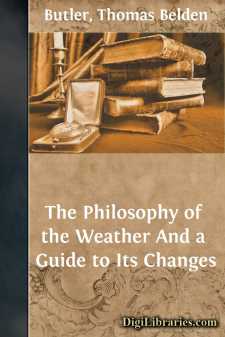Categories
- Antiques & Collectibles 13
- Architecture 36
- Art 48
- Bibles 22
- Biography & Autobiography 813
- Body, Mind & Spirit 142
- Business & Economics 28
- Children's Books 17
- Children's Fiction 14
- Computers 4
- Cooking 94
- Crafts & Hobbies 4
- Drama 346
- Education 46
- Family & Relationships 57
- Fiction 11829
- Games 19
- Gardening 17
- Health & Fitness 34
- History 1377
- House & Home 1
- Humor 147
- Juvenile Fiction 1873
- Juvenile Nonfiction 202
- Language Arts & Disciplines 88
- Law 16
- Literary Collections 686
- Literary Criticism 179
- Mathematics 13
- Medical 41
- Music 40
- Nature 179
- Non-Classifiable 1768
- Performing Arts 7
- Periodicals 1453
- Philosophy 64
- Photography 2
- Poetry 896
- Political Science 203
- Psychology 42
- Reference 154
- Religion 513
- Science 126
- Self-Help 84
- Social Science 81
- Sports & Recreation 34
- Study Aids 3
- Technology & Engineering 59
- Transportation 23
- Travel 463
- True Crime 29
The Philosophy of the Weather And a Guide to Its Changes
Description:
Excerpt
INTRODUCTION.
The atmospheric conditions and phenomena which constitute “The Weather” are of surpassing interest. Now, we rejoice in the genial air and warm rains of spring, which clothe the earth with verdure; in the alternating heat and showers of summer, which insure the bountiful harvest; in the milder, ripening sunshine of autumn; or the mantle of snow and the invigorating air of a moderate winter’s-day. Now, again, we suffer from drenching rains and, devastating floods, or excessive and debilitating heat and parching drought, or sudden and unseasonable frost, or extreme cold. And now, death and destruction come upon us or our property, at any season, in the gale, the hurricane, or the tornado; or a succession of sudden or peculiar changes blight our expected crops, and plant in our systems the seeds of epidemic disease and death. These, and other normal conditions, and varied changes, and violent extremes, potent for good or evil, are continually alternating above and around us. They affect our health and personal comfort, and, through those with whom we are connected, our social and domestic enjoyments. They influence our business prosperity directly, or indirectly, through our near or remote dependence upon others. They limit our pleasures and amusements—they control the realities of to-day, and the anticipations of to-morrow. None can prudently disregard them; few can withhold from them a constant attention. Scientific men, and others, devote to them daily hours of careful observation and registration. Devout Christians regard them as the special agencies of an over-ruling Providence. The prudent, fear their sudden, or silent and mysterious changes; the timid, their awful manifestations of power; and they are, to each and all of us, ever present objects of unfailing interest.
This interest finds constant expression in our intercourse with each other. A recent English writer has said: “The germ of meteorology is, as it were, innate in the mind of every Englishman—the weather is his first thought after every salutation.” In the qualified sense in which this was probably intended, it is, doubtless, equally true of us. Indeed, it is often not only a “first thought” after a salutation, but a part of the salutation itself—an offspring of the same friendly feeling, or a part of the same habit, which dictates the salutation—an expression of sympathy in a subject of common and absorbing interest—a sorrowing or rejoicing with those who sorrow or rejoice in the frowns and smiles of an ever-changing, ever-influential atmosphere.
If consistent with our purpose, it would be exceedingly interesting to trace the varied forms of expression in use among different classes and callings, and see how indicative they are of character and employment.
The sailor deals mainly with the winds of the hour, and to him all the other phases of the weather are comparatively indifferent. He speaks of airs, and breezes, and squalls, and gales, and hurricanes; or of such appearances of the sky as prognosticate them....


